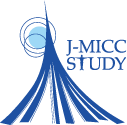Introduction
You have probably heard of the relationship between lifestyle and disease. Some examples are obesity is bad for the heart, excessive drinking is bad for the kidneys, smoking damages one’s health, and so on.
Actually, these things have been found out through long-term epidemiological studies.
By examining many people’s health conditions, lifestyles, living environments, etc., we can clarify the spread of various diseases and their causes, and seek methods of prevention and treatment. Some examples discovered through such research are that we have come to understand the relationship between smoking and lung cancer, and Helicobacter pylori’s influence on stomach cancer. Such findings are utilized to improve and enhance our health conditions.
Purpose of Study
J-MICC STUDY, or Japan Multi-Institutional Collaborative Cohort Study, purports to survey and follow up on the health conditions of more than 100,000 people over 20 years of age to determine what kind of person is susceptible to what kind of diseases under which circumstances. By examining the relationship between diseases and combinations of lifestyles, genetic types and blood components, we will investigate the causes of cancer and other lifestyle related diseases. Thus we intend to provide basic data essential to coming up with prevention measures against lifestyle related diseases, including cancer, taking each individual’s body constitution into consideration.
Although the fruits of this study may not affect you immediately, they will contribute to the health maintenance and improvement for your children, grandchildren and even further future generations. They will promote the good health of people of all over the world, as well as in this country.
Method of Survey
- From 2005 to 2013
- Baseline survey
- From 2010 to 2018
- Second survey
- From 2005 to 2024
- Follow-up surveys
- From 2016
- Baseline survey (secondary)
| Baseline survey |
You will be asked to fill in a health questionnaire on your lifestyle, health conditions, etc. At the same time, you will be asked to cooperate with blood sampling. The blood samples will be cryogenically-preserved long-term for analyses of blood components and genes. Should you have a medical examination at the time of registration, please provide related information as well. |
| Second survey |
Five years after registration, you will be asked to fill in a health questionnaire and provide a blood sample, as you did at the time of registration. |
| Follow-up surveys |
We will follow up on your health information from the initial registration for up to 20 years, until 2024, though the follow-up period may be reconsidered during the course. "Follow up" means to keep informed of your health status. For this purpose, we will inquire about your health status through mail, access to a copy of your death certificate and basic resident register, hospital referrals, and gather information such as the cancer registry, in compliance with the established formalities, (Information to be used differs from one region to another). Should you pass away before the 20 years have passed, the survey will be terminated at that point. Should you move out of your registered region, your survey will stop at that point. |
Your personal data will be used exclusively for the purpose of the study. All information will be anonymized before it is sent to the Central Office of J-MICC STUDY (Department of Preventive Medicine, Nagoya University Graduate School of Medicine), and undergoes thorough analyses under stringent supervision. Scrupulous care will be taken to avoid personal identification and information leakage.
Survey Target
- Those who live in regions designated by the participating institutions.
- Those who visit participating medical facilities.
From the above mentioned categories, we will recruit approximately 50,000 people of either sex, (a total of 100,000 people) from 35 to 69 years of age. Our staff will ask potential survey respondents to participate and cooperate. If you are asked to participate, you are totally free to accept or decline, and there is no disadvantage on your part due to declining to participate.
Financial Resources of Study
This study is supported by Grant-in-Aid for Scientific Research on Priority Areas of Cancer(No.17015018) (2005 to 2009), Grant-in-Aid for Scientific Research on Innovative Areas(No.221S0001)(2010 to 2015), and Grant-in-Aid for Scientific Research on JSPS KAKENHI Grant Number JP(No.16H06277)(since 2016) from the Ministry of Education, Culture, Sports, Science and Technology.


